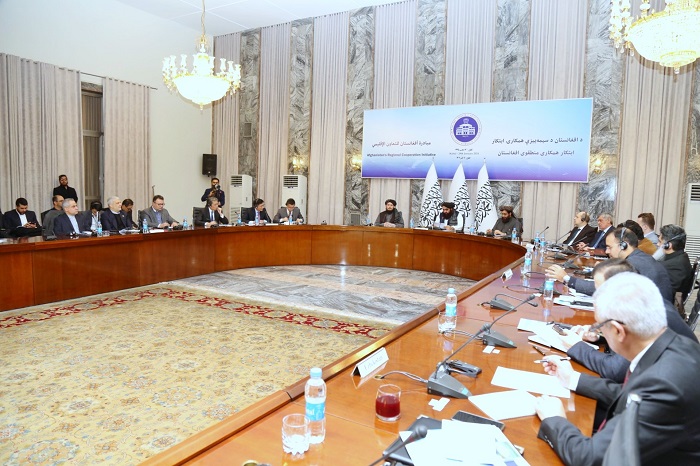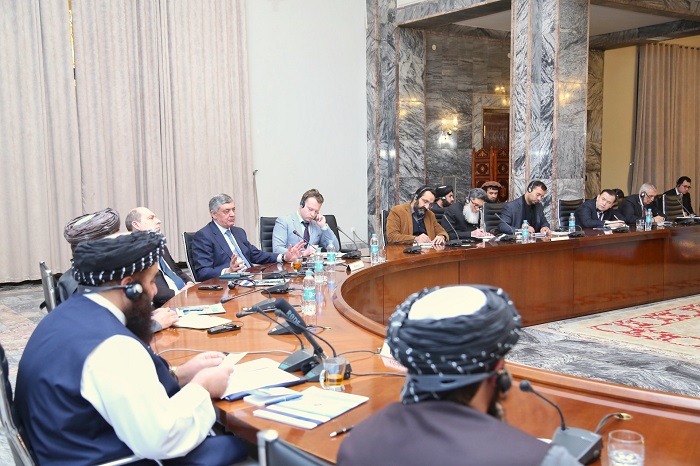Afghanistan’s Regional Cooperation Initiative meeting brought together representatives and ambassadors of 12 neighboring and regional countries on Monday in Kabul.
Under discussion was the need for positive interaction between regional countries and the Islamic Emirate, coordination in the field of regional cooperation, creation of a common region-oriented narrative at a regional level and joint cooperation to make the most of economic opportunities the region has to offer.
Countries represented were India, Kazakhstan, Turkey, Russia, China, Iran, Pakistan, Uzbekistan, Turkmenistan, Indonesia, Kyrgyzstan and Afghanistan.
Addressing participants, the Islamic Emirate of Afghanistan’s (IEA) acting foreign minister Amir Khan Muttaqi said the meeting was mainly aimed at discussions and talks on establishing a “region-centric narrative aimed at developing regional cooperation for a positive and constructive engagement between Afghanistan and regional countries.”
He said regional cooperation could be focused on the following:
- Exploring region-centric and engagement pathways based on common regional benefits;
- Creating a region-centric narrative for positive and constructive engagement with the Afghan government to tackle existing and potential threats in the region;
- Exerting efforts directed at soft connectivity and hard connectivity that would lead to regional economic development benefitting peoples of the region;
- Unanimity in calling for the removal of unilateral sanctions on the region and on Afghanistan in particular; and
- Respecting one another’s choices of indigenous and traditional development models and governance methods.
He said since the IEA’s takeover in August 2021, there have been positive developments in the areas of trade and transit with countries in the region.
According to him, the end of the war and the IEA’s “economy-centered foreign policy” has paved the way for the IEA “to work together on common interests in cooperation with the region by creating a region-centric narrative and continue to fight potential threats.”
Muttaqi stated that under the IEA it has “been proven that a regional perspective revolving around economic connectivity with the region at its center constitutes one of the fundamental pillars of the Islamic Emirate’s foreign policy.”
He stated however that the IEA “respects others’ interests, choices, government structures, and development models, and in return, expects others to respect Afghanistan’s interests, and governance and development choices and models. “
He went on to say that after a 20-year “fight for freedom”, it became clear that “imported plans for Afghanistan did not heal the pain of the Afghan people.
“Whether it was models offered by countries or international organizations…or the plans by special envoys…the alien prescriptions presented under any name and address have had reverse results. Moreover, unfortunately the UN plans conveyed during the tenures of its various envoys also has led to nothing but war, instability, and occupation of Afghanistan.”
He stated that today, Afghanistan is a sovereign, free, and safe country with a “government representing Afghanistan” that “stands ready and has the capacity to conduct talks on common and concerning issues with different regional and international sides.”
He went on to say Afghanistan does not seek confrontation nor controversy with any side, but wants positive engagement.
“Therefore, our choices shall be respected. Instead of proposing governance models and pointing fingers at the system, it is better to engage on mutual interests,” he said.
He noted that Afghanistan, like any other country, has problems. “A country that has been the target of foreign invasions and interventions and internal wars for nearly half a century, it is not possible to resolve all the problems in a short period of time.
“Nevertheless, the Islamic Emirate of Afghanistan is resolved to find solutions for the problems that [are] mostly inherited from the past,” he said.
“Grabbing this opportunity and initiative, also through the remaining regional mechanisms such as Afghanistan’s neighboring countries ministerial meeting or the Moscow format, we hope to succeed in reaching a regional consensus that preserves all actor’s interests.
“Within the framework of such regional consensus, we can pave the way for finding incentive mechanisms to reach thematic agreements that serve mutual interest.”
Meanwhile, Dr. Mohammad Naeem, head of the Afghan embassy in Doha, said the Islamic Emirate assures countries participating in the meeting that the IEA gives priority to having positive relations with countries in the region.
According to him, the Islamic Emirate wants to convey the message that Afghanistan is ready to be actively present in regional initiatives. ///Originally published by ArianaNews, 29 January 2024

